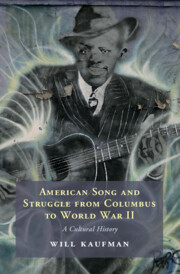Book contents
- American Song and Struggle from Columbus to World War II
- American Song and Struggle from Columbus to World War II
- Copyright page
- Praise for American Song and Struggle
- Dedication
- Contents
- Figures
- Preface
- Acknowledgments
- Introduction
- Chapter 1 Broken Spears and Songs of Sorrow
- Chapter 2 Good Newes from Virginia
- Chapter 3 A Capital Chop
- Chapter 4 If I Had but a Small Loaf of Bread
- Chapter 5 Where Today Are the Pequot?
- Chapter 6 There Is a Fountain Filled with Blood
- Chapter 7 A Tragedy That Beggared the Greek
- Chapter 8 Muscle, Blood, and Steel
- Chapter 9 Rule Anglo-Saxia
- Chapter 10 The Hand That Feeds You
- Chapter 11 We Are Many
- Chapter 12 100% American
- Chapter 13 We’re Up Against It Now
- Chapter 14 The Panic Is On
- Chapter 15 To Thee We Sing
- Conclusion
- Notes and Sources
- Song Index
- General Index
Chapter 15 - To Thee We Sing
Published online by Cambridge University Press: 30 July 2022
- American Song and Struggle from Columbus to World War II
- American Song and Struggle from Columbus to World War II
- Copyright page
- Praise for American Song and Struggle
- Dedication
- Contents
- Figures
- Preface
- Acknowledgments
- Introduction
- Chapter 1 Broken Spears and Songs of Sorrow
- Chapter 2 Good Newes from Virginia
- Chapter 3 A Capital Chop
- Chapter 4 If I Had but a Small Loaf of Bread
- Chapter 5 Where Today Are the Pequot?
- Chapter 6 There Is a Fountain Filled with Blood
- Chapter 7 A Tragedy That Beggared the Greek
- Chapter 8 Muscle, Blood, and Steel
- Chapter 9 Rule Anglo-Saxia
- Chapter 10 The Hand That Feeds You
- Chapter 11 We Are Many
- Chapter 12 100% American
- Chapter 13 We’re Up Against It Now
- Chapter 14 The Panic Is On
- Chapter 15 To Thee We Sing
- Conclusion
- Notes and Sources
- Song Index
- General Index
Summary
Franklin D. Roosevelt and the New Deal both get mixed reviews in song. The Dust Bowl hits the middle of the country, bringing to the fore not only Woody Guthrie and “Sis” Cunningham but also a stable of lesser-known “Dust Bowl Balladeers.” The Harlan County Wars continue in Kentucky, and the balladry proliferates. Sit-down strikes rock Detroit, and their songs resound. “We Shall Not Be Moved” becomes a Spanish-language anthem, and Rafael Hernández Marín sings of Puerto Rico’s Ponce Massacre. Abel Meeropol takes on lynching with his masterpiece, “Strange Fruit,” and Lead Belly damns the racism of the nation’s capital with his “Bourgeois Blues.” The Popular Front resurrects Lincoln as a working-class hero in song, and the fighters of the Lincoln Battalion in Spain march to their own battle tunes. The arenas of musical theater, dance, classical music, and jazz also become battlegrounds with Blitzstein’s The Cradle Will Rock, Harold Rome’s Pins and Needles, William Grant Still’s Lenox Avenue, Helen Tamiris’s How Long, Brethren?, Langston Hughes’s Don’t You Want to Be Free?, and John Hammond’s From Spirituals to Swing concerts. Marian Anderson transforms “America” from the steps of the Lincoln Memorial, and Paul Robeson sings a “Ballad for Americans” from coast to coast.
Keywords
- Type
- Chapter
- Information
- American Song and Struggle from Columbus to World War 2A Cultural History, pp. 333 - 365Publisher: Cambridge University PressPrint publication year: 2022

